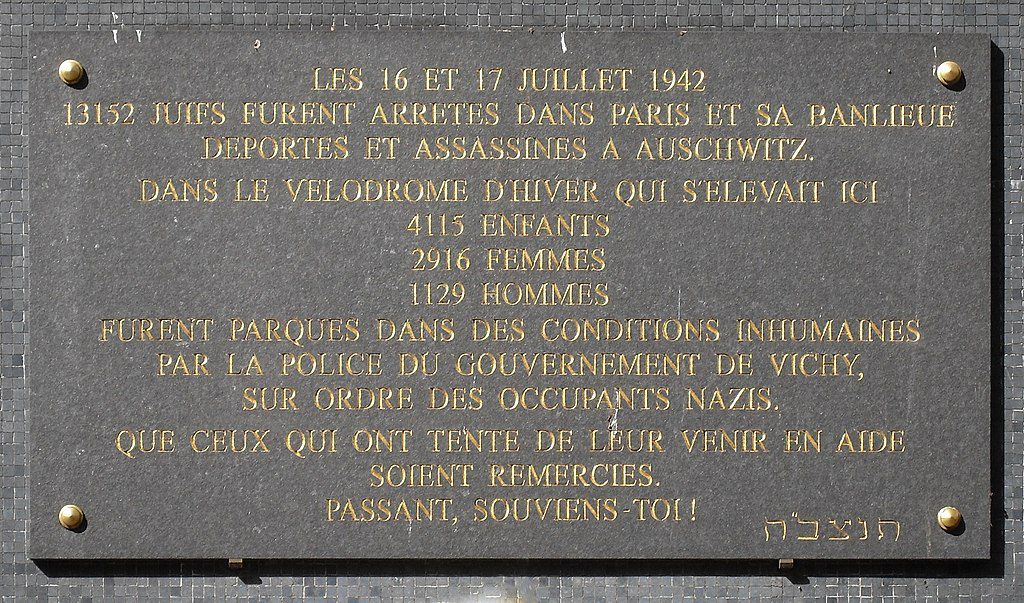No products in the cart.

Mathilde Panot, the leader of the La France Insoumise (LFI) deputies in the French National Assembly, has been multiplying provocations for several days in order to discredit both Emmanuel Macron’s camp and her opponents from the Rassemblement National. As a result, the hemicycle is the prey of polemics and agitated exchanges that contrast sharply with the calm of the previous months. The commemoration of the 80th anniversary of the Vel d’Hiv roundup on 16 July 2022 gave her the opportunity for a new stunt.
A few days ago, France honoured the memory of the Parisian Jews who were collectively arrested between 16-17 July, 1942, to be deported to concentration camps. Known as the Vel d’Hiv round-up, it was the biggest operation carried out in Paris on behalf of the German authorities during the Second World War with the complicity of the French police force. Over 13,000 men, women, and children were sent to their deaths.
Since the end of WWII, the subject has been very sensitive politically because it raises the question of France’s collaboration in Hilter’s genocidal agenda. The traditional line, embodied by General de Gaulle and maintained for decades, was to minimise France’s responsibility. It was argued that since the Vichy authorities received orders from Maréchal Pétain, who was legal but not legitimate, France did not need to sink into repentance and guilt for this terrible event. Things changed with President Jacques Chirac in 1995. In a speech delivered in front of the monument commemorating the roundup, Chirac openly acknowledged for the first time that France was “responsible.” Since then, the French political class has aligned itself with the line set by Jacques Chirac—a point of view that Marine Le Pen may have contested in 2017, and more recently, Éric Zemmour.
The LFI deputy Mathilde Panot re-launched the controversy by posting on Twitter on Saturday, July 16th, a direct accusation against Emmanuel Macron and the Rassemblement National, united in a single attack: “Eighty years ago, the collaborationists of the Vichy regime organised the Vél’d’Hiv round-up. We must not forget these crimes, today more than ever, with a President of the Republic who honours Pétain and 89 RN deputies.”
Il y a 80 ans, les collaborationnistes du régime de Vichy ont organisé la rafle du #VeldHiv
— Mathilde Panot (@MathildePanot) July 16, 2022
Ne pas oublier ces crimes, aujourd’hui plus que jamais, avec un président de la République qui rend honneur à Pétain et 89 députés RN !
The tweet triggered a wave of indignant reactions in the ranks of the presidential majority, as well as in all the political parties.
Mathilde Panot’s accusation against Emmanuel Macron refers to a 2018 statement in which the president acknowledged that Maréchal Pétain remained a “great soldier” of the First World War, and as such deserved a tribute, in the same way as the other marshals, on the occasion of the ceremonies commemorating the end of the first World War:
Maréchal Pétain was a great soldier during the First World War, that is a reality of our country. This is also what makes political life, like human nature, sometimes more complex than we might think. One can have been a great soldier in the first World War and have made disastrous choices in the second.
Today, Panot is resurrecting these statements while identifying Rassemblement National MPs under the label of “collaborationists.” “No limit to indecency,” several ministers reacted to condemn the tweet. The term “indecency” was also used by Thomas Ménagé, an RN deputy who participated in the ceremonies commemorating the roundup.
The affair was not limited to exchanges on the web. The controversy entered the National Assembly. Monday night of July 18th, the deputies were examining provisions of the law on purchasing power proposed by the government. During the debates, Mathilde Panot took the floor, provoking the departure of the Rassemblement National deputies in protest against her accusations of “collaborationism.”
The debate continued on Twitter and provided an opportunity for heated historical clarifications from both sides. La France Insoumise accuses the Rassemblement National of being a party heir to Maréchal Pétain, forgetting that it counts many resistance fighters among its founders. On the right, La France Insoumise is reminded that the extreme Left collaborated with Nazi Germany until the end of 1941, but also that the organisers of the round-up were all … left-wing politicians.
Les collaborationnistes qui ont organisé la rafle du #VeldHiv étaient Pierre Laval ancien de la SFIO et René Bousquet le Radical Socialiste ami de #Mitterrand
— Jean-Marc Alric (@jmAlric11) July 16, 2022Quel rapport avec #Macron et le #RN ?
Once more, French political life is being plagued by controversies over history and repentance.